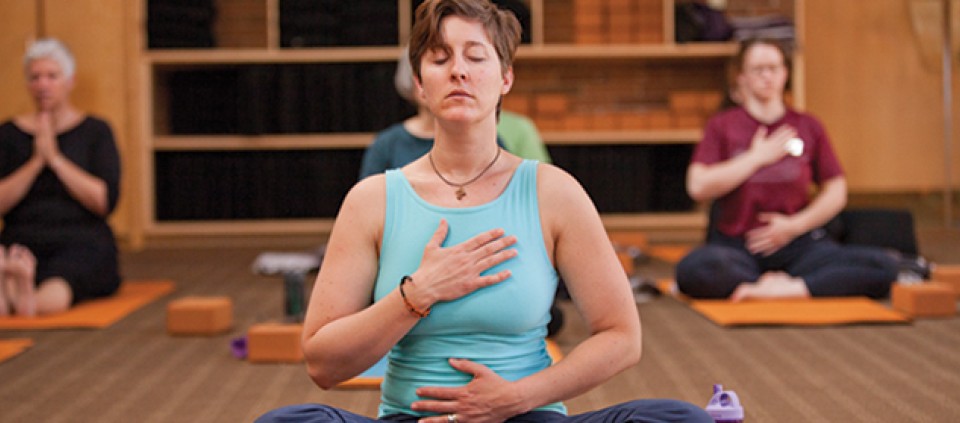Loving My Imperfect Self

It’s been a rough year on the planet, with headline news that’s often heartbreaking or horrifying. In addition, so many people I know are losing loved ones or facing serious health issues. During such tender times, and a year of great loss in my own life, I’m learning so much about the need to embrace my imperfect humanity.
Acknowledging my vulnerability and perceived shortcomings, and seeking to love all of who I am, is absolutely the most challenging journey I’m on. While it sometimes feels as if the process is painstakingly slow, and even backwards at times, I can track progress.
I distinctly remember two moments of awakening on this journey. The first one took place during a yoga class in which Stephen Cope was leading us in Head to Knee pose. As I extended my torso over my left leg, Stephen said, “Don’t abandon your body.”
His words changed my life.
For years, I had criticized, abused, and rejected my body, viewing it as flawed. In that moment in class, I saw it as something deserving and desiring of my affection. It was the beginning of a newfound respect for my physical self, which I now honor with messages of love and gratitude because I know it’s always listening and doing its best.
My second big awakening came at the end of a romantic relationship, right before the holidays. Sobbing over a man who couldn’t return my affections, I suddenly wrapped my arms around myself and said out loud, “I’m so sorry this happened. I love you, and you deserve a man who will love you, and stay.”
Two weeks later, I met one who did.
Although that relationship ended after several years, it was full of more unconditional love and devotion than I’d ever received from a man. I think that’s because of the decision I made on that tearful evening: to love myself first.
There’s a quote, attributed to the Buddha, that goes, “You, yourself, as much as anyone in the entire universe, deserve your love and affection.” That’s not the message most of grew up with, so we have to learn it as adults and unlearn our tendency toward harsh self-criticism. When I teach creative recovery workshops, my students are often surprised to discover that treating themselves kindly, not beating themselves up, is what actually motivates them to improve their lives.
As humanistic psychologist Carl Rogers wrote, “The curious paradox is that when I accept myself just as I am, then I can change.”
Likewise, my coaching clients often need reminding of how much they’ve done and how far they’ve come when they’re only focused on their perceived inadequacies and unmet goals. We’re all so hard on ourselves, when acknowledgment and kindness would go a much longer way.
I’m not talking about self-indulgence or self-pity, which is often destructive. I’m talking about the kind of compassion and positive self-regard that makes us want to care for ourselves, do better, and try again.
Love inspires that.
Kristin Neff, a leading researcher on self-compassion, notes that it doesn’t make pain or hardship go away. Instead, it acknowledges that life involves failure and suffering, and gives us “permission to be human,” as I often heard from Tal Ben-Shahar in Kripalu’s Certificate in Positive Psychology program. Self-compassion—being our own best friend—helps us find comfort and connection within ourselves when times are hard.
Sometimes self-forgiveness is a necessary first step. We might need to view any actions we regret through the lens of understanding, affirming that we did the best we could at the time. That can lead to making amends to ourselves and others, as the energy blocked up when we don’t forgive is set free.
Recently, I spoke with someone whose life has been turned upside down by a health crisis. When I told him I was sorry for his suffering, he replied that it was his own fault, and he knew others who were much worse off. “Yes,” I said, “but that doesn’t mean you aren’t having a hard time.”
His face softened as he acknowledged that he was, in fact, really struggling to cope with his condition.
Self-compassion has become my primary practice, and it doesn’t require a mat or a change of clothes. It requires only mindful awareness of my inner voices and inwardly directed messages of support and encouragement. It can be practiced anywhere, anytime, and the only posture involved is a hand placed gently over the heart.
Sharing that gesture of affection with my imperfect self, I feel somehow better and less alone.
Find out about the Month of Compassion at Kripalu.
Kim Childs is a Boston-based life and career coach and writer who specializes in positive psychology. She is also a Kripalu Yoga teacher and facilitator of workshops based on The Artist's Way: A Spiritual Path to Higher Creativity, by Julia Cameron.
© Kripalu Center for Yoga & Health. All rights reserved. To request permission to reprint, please e-mail editor@kripalu.org.
Kim Childs is a Boston-area life and career coach specializing in Positive Psychology, creativity, and spiritual living. She writes for Kripalu.
Full Bio and Programs